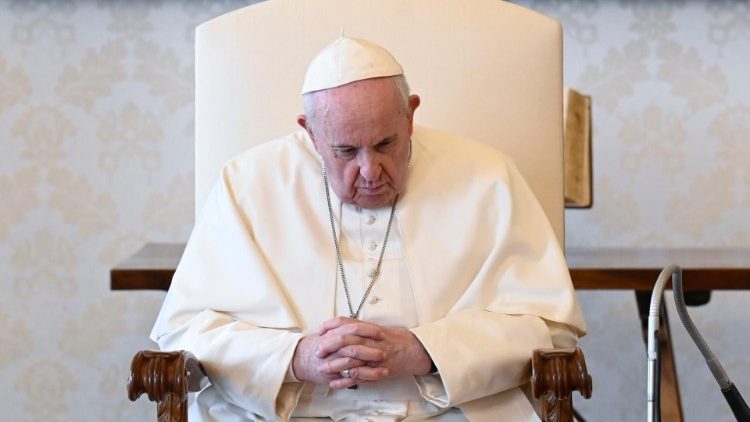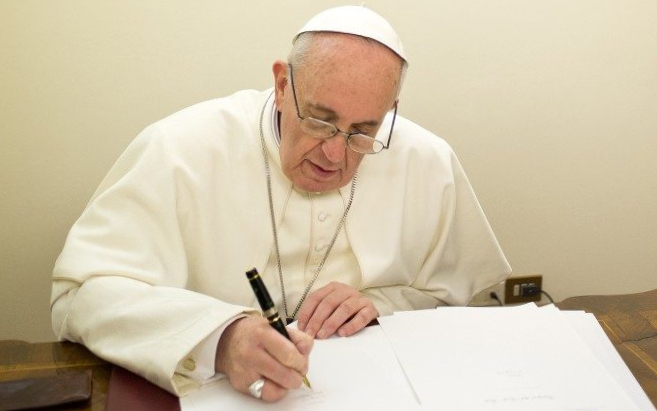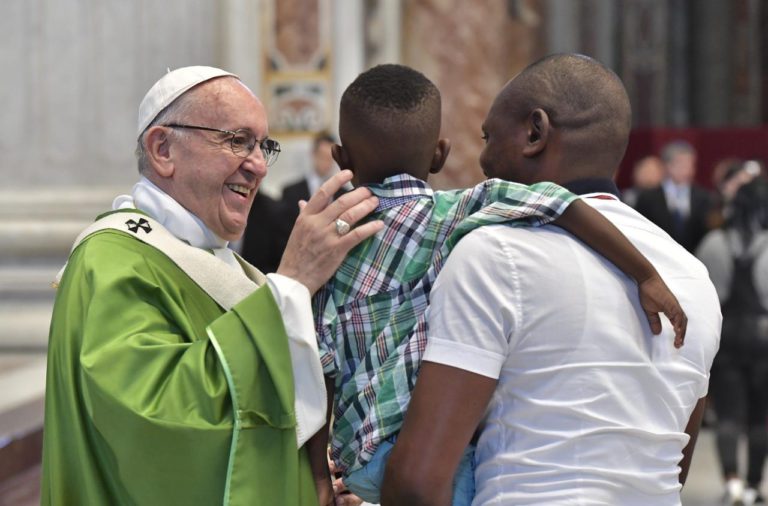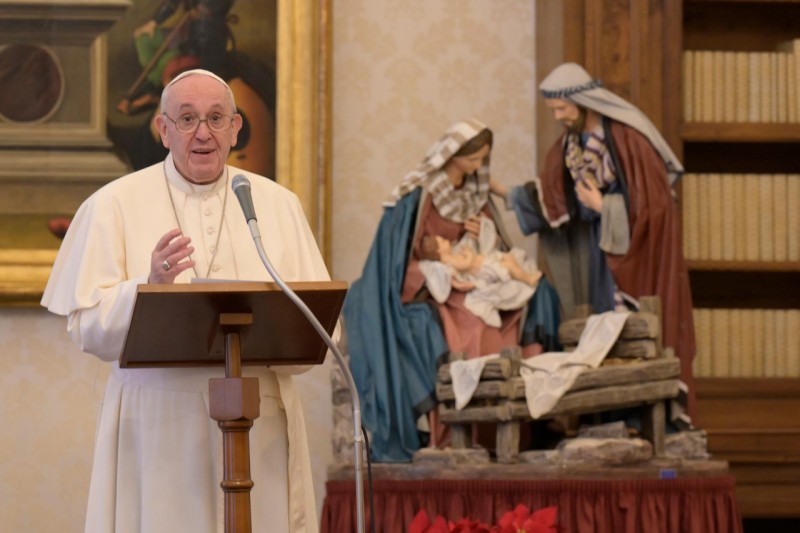Here Is Apostolic Constitution “Pascite Gregem Dei”
The document reforms Book VI of the Code of Canon Law

With the Apostolic Constitution Pascite Gregem Dei (Tend the Flock of God), presented today, June 1, 2021, Pope Francis has reformed Book VI of the Code of Canon Law on criminal penalties in the Church. The change will come into force on December 8, 2021.
As the Secretary of the Pontifical Council for the Interpretation of Legal Texts, Monsignor Juan Ignacio Arrieta Ochoa de Chinchetru pointed out, the text now contains an adequate specification of the criminal rules that didn’t exist before, to give a precise and certain orientation to those that must apply them. Introduced in the Code are “some penalties that had already been sketched by the Congregation for the Doctrine of the Faith and other dicasteries, suggestions on what up to now was not a crime, the obligation to denounce the crimes in the case of specific persons.”
The document, he said, pays special attention “to crimes of a patrimonial character with the obligation to remedy, repair the damage and restore.” “In the realm of minors, fundamental was the displacement of this crime from the special obligations of clerics, within the category in which are also the crime of homicide, the crime of abortion and crimes against life, liberty and the dignity of the person.”
Reform Initiated by Benedict XVI
“To respond adequately to the needs of the Church worldwide, the need was evident to revise as well the criminal discipline promulgated by Saint John Paul II on January 25, 1983, with the Code of Canon Law. It was necessary to modify it so that it would allow Pastors its use as agile, salutary and corrective instrument, and that it could be used in time and with caritas pastoralis, in order to prevent greater evils and heal the wounds caused by human weakness,” explains the Holy Father in the quoted Apostolic Constitution.
In the text, the Holy Father recalls that in 2007 Benedict XVI entrusted to the Pontifical Council for the Interpretation of Legislative Texts the task to undertake the revision of the criminal normative contained in the 1983 Code.” Therefore, this study was carried out “in a spirit of collegiality and collaboration, soliciting the intervention of experts and Pastors, and addressing possible solutions in keeping with the needs and culture of the different local Churches.”
The Pope also says that in the course of the centuries laws have been given to the Church, which “have become a coherent body of binding social norms, which confer unity to the People of God and whose observance is the responsibility of the Bishops.” In this connection, he highlighted earlier that “the Pastor is called to exercise his commitment ‘with his counsels, his exhortations, his examples, but also with his authority and sacred power’ (Lumen Gentium, n. 27), as charity and mercy exact that a Father dedicate himself also to straighten what perhaps has been twisted.”
The Church’s Mercy and Correction
This is a spiritual commitment that “must be excercized as a concrete and indisputable exigency of charity before the Church, before the Christian community and eventual victims, and also in relation with one who has committed a crime, who is in need, at the same time, of the mercy and correction of the Church.”
The Pontiff acknowledges that much “damage was occasioned in the past because of the lack of understanding of the profound relation that exists in the Church between the exercise of charity and the carrying out of the sanctioning discipline, as long as the circumstances and justice require it.” This way of thinking has made correction difficult and has “aggravated, in many cases, the scandal and confusion among the faithful.” Therefore, the “application of the punishments is necessary on the part of Pastors and Superiors.”
Charity calls for “Pastors to take recourse to the penal system whenever they should do so, keeping in mind the three ends that make it necessary in the ecclesial society, namely, the re-establishment of the exigencies of justice, the amendment of the offender and reparation of the scandals.,” he continues.
Novelties and Improvements
The new text brings “changes of different types to the law in force up to now, and it sanctions some new criminal types. In particular, many of the novelties in the text respond to the ever more extensive need in communities to see justice and order re-established, which the crime has broken.”
The text is also improved “from the technical point of view, especially in regard to some fundamental aspects of the criminal law as, for example, the right to defense, the prescription of the criminal and penal action, a clearer determination of punishments,” which responds “to the needs of criminal legality and offers ordinaries and judges objective criteria when it comes to singling out the most appropriate sanction to apply in each concrete case.”
This is an Exaudi working English translation of the full text of the Apostolic Constitution “Pascite Gregem Dei” which reforms Book VI of the Code of Canon Law:
***
“Tend the flock of God that is your charge, not by constraint but willingly, according to God” (Cf. 1 Peter 5:2). These inspired words of the Apostle Peter resound in the rite of Episcopal Ordination: “Jesus Christ, Our Lord, sent by the Father to redeem mankind, sent in turn the twelve Apostles throughout the world so that, full of the strength of the Holy Spirit, they would proclaim the Gospel, govern and sanctify all peoples, bringing them together in one flock. (. . . ) He [Jesus Christ, Lord and Eternal Pontiff] is who, making use of the Bishop’s preaching and pastoral solicitude, leads you through the earthly pilgrimaging to eternal happiness” (Cf. Ordination of the Bishop, the Presbyters and the Deacons, translation of reprinted Spanish version of 2011, n. 39). And the Pastor is called to exercise his commitment “with his counsels, his exhortations, his examples, but also with his authority and sacred power” (Lumen Gentium, n. 27), as charity and mercy call for a Father to dedicate himself also to straighten what perhaps has become twisted. Since Apostolic times, going forward on her earthly pilgrimage, the Church gave herself laws for her way of acting that, in the course of the centuries have become a coherent body of binding social norms, which confer unity to the People of God and for whose observance the Bishops are responsible. These norms reflect the faith we all profess, and from it stems the obligatory force of these norms that, founded on that faith, manifest also the maternal mercy of the Church, which always has as her end the salvation of souls. Having to organize the life of the community in its temporal dimension, those norms need to be in permanent correlation with the social changes and the new needs that appear in the People of God, which on occasions obliges to rectify and adapt them to the changing situations.
In the context of the swift social changes we are experiencing, very conscious that “we are not living simply a time of changes but a change of time,” (Roman Curia on the occasion of the presentation of the Christmas greetings, December 21, 2019), and in order to respond adequately to the exigencies of the Church worldwide, the need became evident to revise as well the criminal discipline promulgated by Saint John Paul II on January 25, 1983, with the Code of Canon Law. It was necessary to modify it so that its use would be allowed to the Pastor as agile, salutary and corrective instrument, which could be used in time and with caritas pastoralis, in order to prevent greater evils and heal the wounds caused by human weakness.
For this reason, in 2007 Our Venerated Predecessor Benedict XVI entrusted to the Pontifical Council for the Interpretation of Legislative Texts the task to undertake the revision of the criminal normative contained in the 1983 Code. On the basis of this charge, the Dicastery dedicated itself to analyze concretely the new needs, to identify the limits and the deficiencies of the legislation in force and to determine possible, clear and simple solutions. This study was carried out in a spirit of collegiality and collaboration, calling on the intervention of experts and Pastors, and addressing the possible solutions with the needs and culture of the different local Churches.
Written as a draft of the new Book VI of the Code of Canon Law, it was sent to all the Episcopal Conferences, to the Dicasteries of the Roman Curia, to the Major Superiors of Religious Institutes, to the Faculties of Canon Law and to other Ecclesiastical Institutions, to gather their observations. Questioned at the same time were numerous canonists and experts in criminal law worldwide. The results of this first consultation, duly ordered, were then examined by a special group of experts, who modified the text of the draft in keeping with the suggestions received, to then submit it again to the examination of the Consultants. Finally, after successive revisions and studies, the final draft of the new text was studied in the Plenary Session of the Members of the Pontifical Council for the Interpretation of Legislative Texts in the month of February of 2020. The correction then having been made indicated by the Plenary, the draft of the text was sent to the Roman Pontiff. Respect and observance of the criminal discipline concerns all the People of God, but the responsibility for its correct application — as said above — corresponds specifically to the Pastors and Superiors of each community. It is a commitment that belongs inseparably to the munus pastorale that is entrusted to them, and which must be exercised as a concrete and indisputable exigency of charity before the Church, before the Christian community and the eventual victims, and also in relation with the one who has committed a crime, who, at the same time, is in need of mercy and the Church’s correction.
Many have been the damages occasioned in the past by the lack of understanding of the profound relation that exists in the Church between the exercise of charity and the carrying out of the sanctioning discipline, so long as the circumstances and justice require it. That way of thinking — experience teaches — entails the risk of temporizing with behaviour that is contrary to the discipline, for which the remedy cannot come only from exhortations or suggestions. This attitude often bears with it the risk that, with the passage of time, such ways of life crystalize making correction more difficult and aggravating in many cases the scandal and confusion among the faithful. Therefore, it is necessary on the part of Pastors and Superiors to apply the punishments. The Pastor’s negligence in using the penal system shows that he is not complying correctly and faithfully with his function, as we have pointed out clearly in recent documents, such as Apostolic Letters in the form of “Motu Proprio”– As a Loving Mother, June 4, 2016, and Vos Estis Lux Mundi, of May 7, 2019.
In fact, charity exacts that Pastors take recourse to the penal system whenever they should do so, keeping in mind the three ends that make it necessary in the ecclesial society, namely, the re-establishment of the demands of justice, amendment of the offender and reparation of the scandals.
As we pointed out recently, the canonical sanction also has a function of reparation and salutary medicine and seeks above all the good of the faithful, so that it “represents a positive means for the realization of the Kingdom, to build justice in the community of the faithful, called to personal and common sanctification” (To the Participants in the Plenary Session of the Pontifical Council for the Interpretation of Legislative Texts, February 21, 2020).
In continuity with the general focus of the canonical system, which follows a tradition of the Church consolidated over time, the new text brings changes of different types to the law in force up to now, and sanctions some new penal types. In a particular way, many of the novelties present in the text respond to the ever wider need in communities to see justice re-established and the order that the crime has broken.
The text is improved, also from the technical point of view, especially in regard to some fundamental aspects of criminal law as, for instance, the right to defense, the prescription of the criminal and penal action, a clearer determination of the punishments, which responds to the exigencies of criminal legality and offer Ordinaries and Judges objective criteria when it comes to singling out the most appropriate sanction to apply in each concrete case.
In the revision of the text — in order to foster the unity of the Church in the application of the punishments, especially in regard to crimes that cause greater harm and scandal in the community –, followed also was servatis de iure servandis, the criterion to reduce the cases in which the imposition of sanctions is left to the discretion of the authority.
Taking all this into account, with the present Apostolic Constitution we promulgate the revised text of Book VI of the Code of Canon Law as it has been ordered and revised, with the hope that it will be an instrument for the good of souls and that, when its necessary, its prescriptions be put into practice by Pastors with justice and mercy, conscious that it is part of their ministry, as a duty of justice — eminent cardinal virtue –, to impose punishments when the good of the faithful exacts it. With the object that all are able to conveniently be informed and know in depth the dispositions of what it is about, I establish that what we have deliberated be promulgated with its publication in L’Osservatore Romano, and then be inserted in the Official Commentary Acta Apostolicae Sedis , coming into force on December 8, 2021.
I also established that, with the coming into force of the new Book VI, the existing Book VI of the Code of Canon Law of the year 1983 is abrogated, without observing anything to the contrary including anything worthy of particular mention.
Given in Rome, at Saint Peter’s, on the Solemnity of Pentecost, May 23, 2021, ninth year of Our Pontificate.
Francis
[Original text: Latin] [Unofficial translation]
Related

New Book VI of Code of Canon Law
Exaudi Staff
01 June, 2021
39 min

Pope’s World Day of Migrants & Refugees Message
Exaudi Staff
06 May, 2021
8 min

Pope’s World Day of Migrants & Refugees Message
Exaudi Staff
06 May, 2021
8 min

Pope Francis: Angelus of Saturday, December 26, 2020
Exaudi Staff
26 December, 2020
5 min
 (EN)
(EN)
 (ES)
(ES)
 (IT)
(IT)

